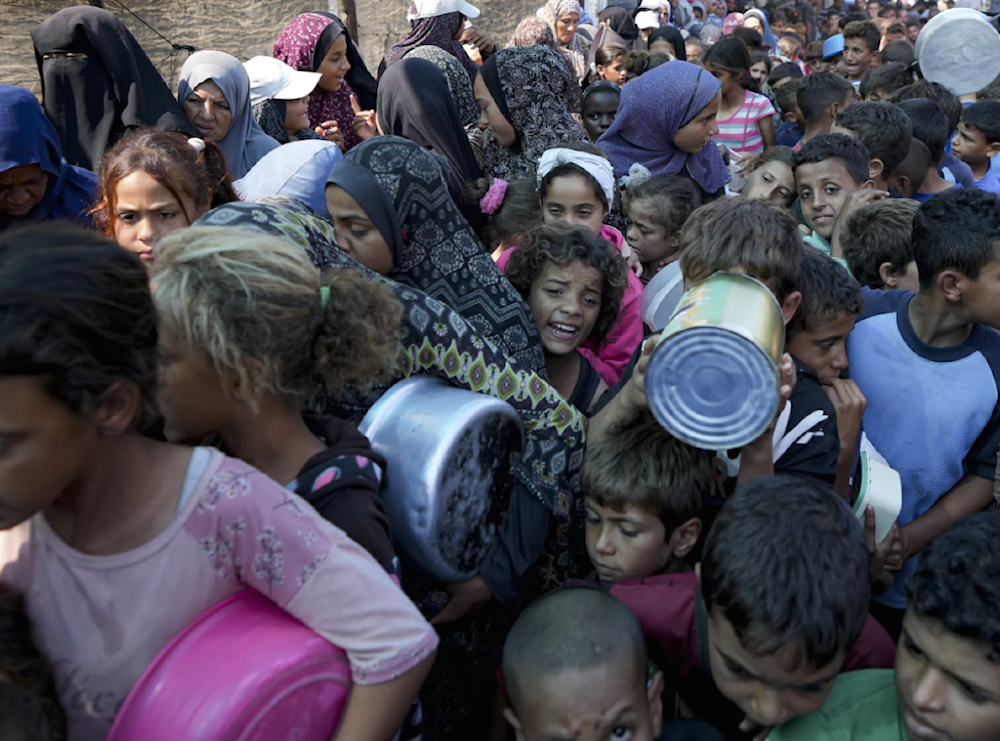'Israel' ignores US ultimatum, aid to Gaza lowest in 11 months
The Israeli occupation was warned last month that if significant aid did not reach the Gaza Strip, sanctions may be imposed on the occupation.
-

Palestinians line up for food distribution in Deir al-Balah on October 17, 2024. (AP)
According to The Guardian, humanitarian aid to Gaza has hit its lowest level since December, with only 8,805 tons of food reaching the strip this month, despite the US's 30-day deadline to enhance humanitarian supplies.
Reports suggest that the US had previously ignored reports by its agencies, which found that "Israel" had blocked food and medicine shipments. According to US law, US aid that any "state" that prevents US aid from reaching its destination should face the consequence of no military aid shipments.
“If no effective action is taken by stakeholders with influence, the scale of this looming catastrophe is likely to dwarf anything we have seen so far in the Gaza Strip since 7 October 2023,” the FRC committee said.
In a last-minute decision, Israeli officials enlarged the authorized “humanitarian zone” in Gaza, but seemingly continue to ignore US demands to allow more humanitarian aid into the strip.
In a letter dated October 13, US Secretary of State Antony Blinken and Defense Secretary Lloyd Austin called for significant improvements to alleviate Gaza’s humanitarian crisis, specifically urging "Israel" to facilitate a minimum of 350 daily truckloads of essential supplies.
Yet, by the end of October, the average daily truckload count entering Gaza stood at only 71, well below the requested target. Blinken noted that while there has been some progress, it remains inadequate.
'Almost nothing getting in'
Aid workers describe the situation in Gaza as "apocalyptic," with over 80% of the population displaced and one UN official expressing “Almost nothing is getting in any more. The small street markets that sprung up have all gone. There’s a bit of flour, some washing-up liquid … a kilo of tomatoes costs nearly $20 [£16]. Even if you have money there is nothing to buy. Everyone is going hungry again."
According to Israeli numbers, only 57 trucks a day were allowed into Gaza in October, significantly below the 350 trucks a day requested by the US and the 600 trucks per day needed by aid agencies to meet basic needs. By November, only 624 trucks had entered Gaza.
Israeli officials deny accusations of deliberately restricting aid, instead blaming humanitarian agencies.
In October, Israeli authorities blocked or hindered 58% of aid movements, according to aid agencies. Additionally, Israeli settlers have caused damage to and obstructed shipments entering Gaza.
Israeli newspaper Haaretz revealed on Monday that the Israeli occupation's military is allowing armed settlers to loot aid trucks that are entering the Gaza Strip and take protection money from aid groups.
The newspaper noted that the settlers are obstructing the road used by a significant portion of trucks entering the Gaza Strip via the Karem Abu Salem crossing, an area fully controlled by the Israeli military, which has reportedly turned a blind eye and refrained from taking any action.
Famine 'imminent' in Gaza
According to Mathew Miller the US State Department spokesperson last week, it is not enough for "Israel" to open new roads allowing aid into Gaza "if more humanitarian assistance isn't going through those roads."
The most severe crisis is unfolding in northern Gaza, where towns like Jabalia, Beit Hanoun, and Beit Lahia have been under siege for over a month, and military checkpoints have been established around the area, ordering residents to evacuate.
The US claimed that it is closely monitoring the situation to ensure that Israeli actions in northern Gaza do not reflect a “policy of starvation.” However, Palestinians, Israeli human rights groups, and even some members of the Israeli military say that "Israel" is carrying out a strategy known as the “generals’ plan,” which they describe as a "surrender or starve" approach aimed at forcing the depopulation of northern Gaza.
Palestinian photographer Khadija Hemaid documents the forced displacement of Palestinian families from Jabalia, north of Gaza. pic.twitter.com/SLWXmKm2Ey
— Gaza Notifications (@gazanotice) November 7, 2024
One UN official from the strip explained that “People in north Gaza have got nothing. Every single day from 3 October to end of month, UN asked to take stuff into Jabaliya, but [was] turned down."
A group of international food security specialists cautioned on Friday that famine is likely to occur soon in parts of the northern Gaza Strip as the Israeli occupation continues its aggression against the Gaza Strip and its people, including women and children.
In a rare alert, the independent Famine Review Committee (FRC) said, "Immediate action, within days not weeks, is required from all actors who are directly taking part in the conflict, or have influence on its conduct, to avert and alleviate this catastrophic situation."
Almost a year ago, the UN described the region as "uninhabitable" due to Israeli airstrikes, warning that failure to make progress could lead to potential cuts in US military aid.

 5 Min Read
5 Min Read








